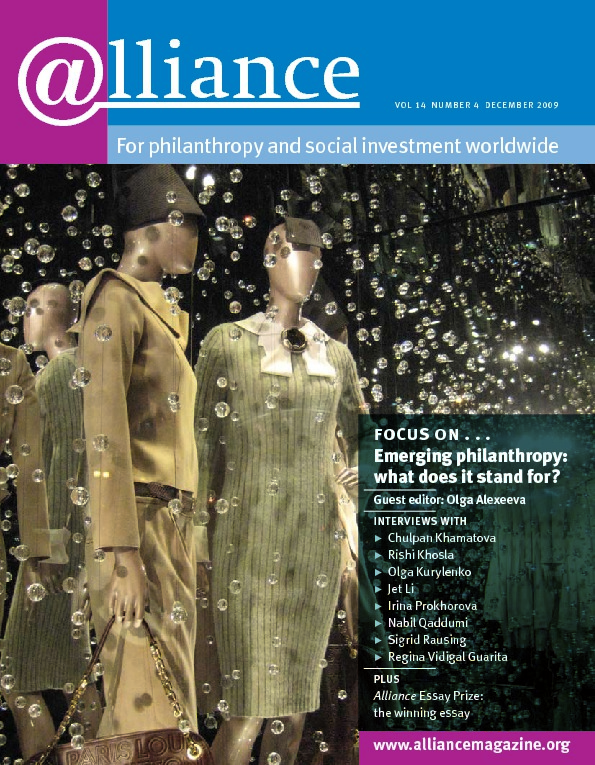For years Richard Branson’s Virgin empire has positioned itself at the youthful cutting edge of innovation and the great shaker-upper of all things establishment. Yet this trendsetting ability eludes it when it comes to social innovation. Just like its challenge to Camelot in its bid to run the National Lottery, its new online donation service, Virgin Money Giving, launched on 25 August, emphasizes its not-for-profit status in an effort to give itself a competitive edge.[1]
In general, however, the trend seems to be to move from not-for-profit to commercial social businesses, especially among the younger generation of social entrepreneurs – for reasons that are hardly surprising. In his September 2006 article for Alliance, Rod Schwartz demonstrated very well the scale of contribution that online commercial entities like Justgiving provide to the giving industry, as well as the efficient use of resources compared to competitors.
 First, there is access to finance. For non-profit entities, this means endless rounds of bids to trusts, foundations and occasionally government, all involving much time and paperwork and probably the hiring of a professional fundraiser (a mission drift cost if ever there was one). Then, very often, the non-profit has to take on projects in order to survive, irrespective of whether the project is appropriate to its mission.
First, there is access to finance. For non-profit entities, this means endless rounds of bids to trusts, foundations and occasionally government, all involving much time and paperwork and probably the hiring of a professional fundraiser (a mission drift cost if ever there was one). Then, very often, the non-profit has to take on projects in order to survive, irrespective of whether the project is appropriate to its mission.
In contrast, investors often loathe paperwork as much as the social entrepreneur and hence agree to keep it to a minimum. The criteria are usually straightforward; the process is cheap; and it is essential that the organization remains focused on its core strategy.
There is also the potential of a larger one-off capital sum to sustain the organization through to profitability, without the ridiculous distinction between core and project funding that so many foundations and trusts love to dwell upon.
The second reason for the growth of social businesses is ownership of the good idea. What incentive is there for a person to have and develop an idea, only to lose ownership of it the moment the not-for-profit structure is put in place? Why shouldn’t someone make money out of a good idea, especially if they come from an impoverished background and need to secure their financial future? Having money not only gives important security to the individual but it also enables them to live a normal life and pursue a long-term career in social innovation. As one young woman said to me, ‘I have always wanted to do good but still be able to wear nice shoes.’ Why shouldn’t she?
If countries in the developing world are to be transformed from beggar economies into self-reliant economies, it will be necessary to mobilize many of those who live there to start their own ventures. To do this effectively, we need to allow funding to flow more easily through the system. Investment finance has its flaws but it is usually easier to raise and distribute than charitable giving, and it creates a more independent mindset in the country itself. Investment is a necessary precondition for a fully functioning trading capacity. If it’s good enough for the British economy, which relies heavily on inward investment, then it’s hard to argue against a developing country wanting similar flows.
The main argument against for-profit social enterprises is the need for accountability. Without a body of trustees and reports to donor organizations, how can the social enterprise be held to account for its social objectives? The fact is that many people have become increasingly cynical about the use charities make of the money given to them. Enormous charities sitting on enormous reserves; the drive to merge organizations with similar aims, thereby squeezing out innovation; and the fights over territory that plague much of the work being done in developing countries, even in disaster relief, are all leading to increased public scepticism about how donations to charity are spent.
Increasingly, people themselves are turning to the new media readily available to gather information and to judge what they consider a socially conscious business. Consumers decided Anita Roddick’s Body Shop was an ethical business; it was TV viewers who decided if Jamie Oliver was doing good in schools. A board of trustees overseeing these ventures would simply have got in the way. It’s time to put our trust in people.
So come on, Richard. Stop waving the non-profit status of your new venture around. It’s old hat and you should know better.
1 See Latest from Alliance, 27 August 2009.
Tommy Hutchinson is the founder and CEO of i-genius, a world community of social entrepreneurs with members in over 90 countries. Email tommy@i-genius.org
http://www.i-genius.org






Comments (0)